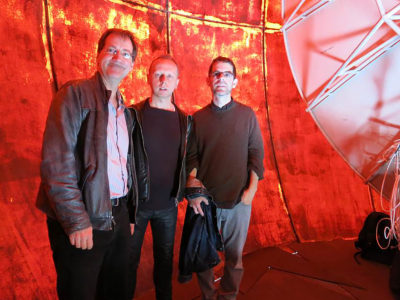
Barraged with push notifications, our daily lives are often defined by a connection to the Internet. The immense quantity of information stored within can only be visualized one way: the cloud.
And if the Internet is what the cloud looks like, then what does it sound like?
Composers and musicians Neil Leonard, Stephen Vitiello and Robin Rimbaud “Scanner” will attempt to answer this question at their upcoming live performance, titled “Sounding the Cloud,” at the Institute of Contemporary Art on Feb. 23.
“Sounding the Cloud” is a part of the greater “Art in the Age of the Internet” project. The ICA invited the composers to be a part of a citywide project, along with many other Greater Boston area partners.
The project has spread throughout the city, but according to Leonard, composer of “Sounding the Cloud” and Berklee College of Music professor, “the ICA is the catalyst” of the project.
“The [“Art in the Age of the Internet”] partners met over the last 12 months to understand more about the ICA’s vision,” Leonard said. “We explored ways that our programming might be compatible, or resonate with, the ICA’s programming.”
When beginning their brainstorming process for the show, they looked back in time.
“My first idea [for “Sounding the Cloud”] was to think of early [musical] works that we did and to revisit works from when the Internet was very new,” Leonard said.
The goal, Vitiello wrote, was to chronicle the Internet’s progression.
“For us, those samples can include sounds that relate to the history of the Internet,” Vitiello wrote. “Such as the clicks and beeps of old modems and the old start-up sounds from when you’d have to dial in to get online.”
The performance will include an assortment of instruments and musical techniques to portray these sounds, including saxophones, modular synthesizers and electronically processed software.
“Sounding the Cloud” seeks not only to provide an audible experience of the cloud but also to mirror its advancement.
“Early on, one was lucky if they could upload and playback a very short, compressed sound file,” Vitiello wrote. “As each year, or week, goes by, the space and speed of the Internet increase.”
Orran Krieger, founding director of the Cloud Computing Initiative at BU, explained the progression from physical storage to virtual storage.
“Now that we have the Internet, we can put computers in massive data centers … [And] instead of a physical computer, virtual computers can hold the information,” Krieger said.
Leonard, Vitiello and Scanner intend to use this expansion during their performance.
“[We’ve discussed starting with] short, compressed, condensed ideas and over the [extent of the concert] expanding the length of sounds, density of layers and [going] from something quite small to something far bigger,” Vitiello wrote.
With this technique, the audience will be able to hear the history of the cloud. The members of “Sounding the Cloud” are not new to combining music and technology.
“I don’t think there’s any composing that I’ve done that doesn’t involve technology,” Vitiello wrote, adding that, while his compositions don’t always include technology conceptually, as “Sounding the Cloud” will, “technology is always part of the process.”
Scanner, too, has experience combining utilizing music in the age of the Internet, having previously been involved in creating a web browser devoid of visuals, experienced solely through sound, Leonard said. Even his nickname, Vitiello wrote, was derived from his work with digital sound effects.
“[Scanner] used radio and police scanners to pull in sounds from cell phones and other voices, integrating them into his performances and recordings,” Vitiello wrote.
For the last few years, Leonard, Vitiello and Scanner have combined their shared skills and backgrounds to create “Sounding the Cloud.”
“Through collaboration, we try to tune into the sounds and musical languages of each other as collaborators and create some sort of coherent dialog … but also create by feeling in the moment of performance,” Vitiello wrote.


























































































































